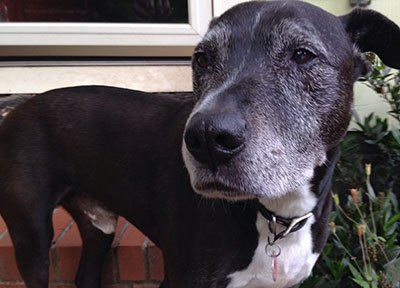
Your Elderly Dog's Health: Considerations for Care
- By
- •
- 23 Jun, 2017

Dogs, just like humans, have changing needs as they grow. As puppies, they need food packed with calories to fuel their explosive growth and brain development. As young adults, they need a balanced diet and plenty of exercise, along with vet check-ups, vaccine boosters, and flea prevention to stay in the best shape possible.
As dogs move into the golden years of "retirement," their needs become more focused and specialized. Many dogs can develop health problems as they age, and proper care is one the best ways to keep your dog healthy and happy. Here's what dog owners need to know about caring for senior dogs.
Changes in Diet
As dogs age, they naturally become a little less active. They just don't run and jump and play as hard as they used to in their youth. Some higher calorie dog food might be too much for them now, so it's best to talk to your vet about whether or not your dog should switch to a lower-energy food made for seniors.
Activity is not the only reason why senior dogs need a diet change. They also have different nutritional needs. A high quality food will provide all the nutrients your pet needs without overeating. High quality food are also easier to digest, which is important for older dogs because their digestive systems can become more sensitive.
Some food specially formulated for older dogs also include vitamins and minerals that can help reduce the symptoms of aging, like sore joints or hair loss.
Changes in Activity
Your dog may not run or jump as much anymore, but that doesn't mean your dog should stop exercising. Exercise is essential for graceful aging in a dog. It helps to maintain muscles strength and can keep joint pain and obesity at bay.
However, don't expect your dog to be able to keep to the same routine as you did before. For example, instead of going for a jog together for 3 or 4 miles, your dog might happily walk just one mile before being ready to head home and rest.
Remember that activity doesn't just benefit the body. Dogs, like humans, experience senility with old age. Practicing old tricks like fetch, lay down, and shake can help keep the brain stimulated and active, protecting against the effects of memory loss and confusion.
Changes in Medical Needs
When your dog was a healthy young dog, you might have only seen your vet for vaccines or the occasional encounter with a porcupine. However, you should plan on vet check-ups being more frequent as your dog ages. Chronic diseases, like cancer and kidney problems, are more common in elderly dogs, and thorough check-ups can help catch some diseases early.
Also, your dog might need more parasite control appointments, and if your dog is showing any signs of illness, you may need to see a vet instead of "waiting it out" or seeking home treatment options. Older dogs don’t have as strong immune systems, so simple sicknesses like colds can be harder for them to overcome without medication. Your pet will also still need vaccines as he or she ages.
Changes in Environment
Finally, your dog may start to have more trouble getting around at home. Stairs might not have been a problem for your dog in the past, but if he or she struggles to go up and down, you might want to move your dog's bed and food to a single level. Dogs who develop arthritis may even need a new bed that is easier to climb into and out of.
Other environmental changes you might consider include spending more time inside, especially for pets that previously mostly lived outdoors in the yard. The temperature changes of outdoor living can be hard on older dogs, and outdoor exposure increases the risk of illness.
For more information about senior pet care, contact us at Hirsch Animal Hospital.



